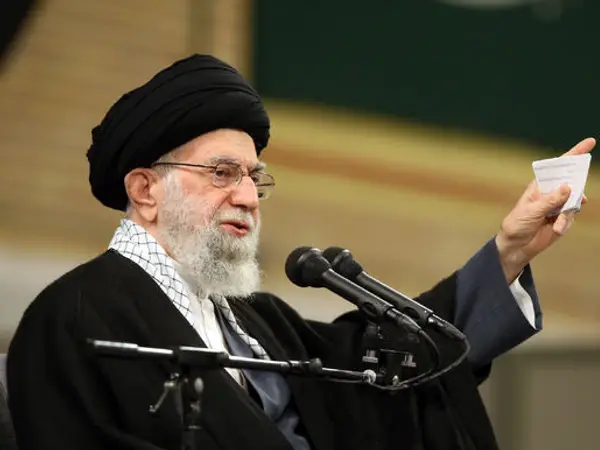Iran’s ruler Ali Khamenei in a speech Monday once again blamed anitgovernment protests on foreign conspiracies, saying the goal was to weaken the Islamic Republic.
Khamenei, who is facing the most serious challenge to his rule since 1989 when he became Supreme Leader, claimed that protesters are not angry about government inefficiency, managerial and economic weaknesses, but on the contrary the antigovernment movement is meant to weaken a strong Islamic Republic.
Popular protests broke out in mid-September when a 22-year-old woman was fatally wounded after being arrested by Iran’s notorious ‘hijab police’. After years of economic decline, increasing poverty and government interference in the private lives of citizens, the incident triggered pent-up frustrations that blew up in street demonstrations.
But unlike previous rounds of unrest, the government was not able to crush the protests in a matter of days and the demonstrators were not asking for reforms but demanding a regime change. Nevertheless, security forces killed more than 500 civilians and arrested close to 20,000 people by the end of December. The government has also hanged four protesters after sham trials, triggering Western condemnations, and isolating the clerical regime.
“In the recent riots, the hand of foreigners was visible, although some have denied it. As soon as we say foreign enemy, some deny it,” Khamenei said, referring to domestic pundits and politicians that say the protesters have genuine grievances.
‘Foreign enemy’ is a favorite term for the 83-year-old authoritarian ruler, who is a staunch opponent of the West and believes he is the leader of the Muslim world, although as a Shiite cleric he cannot be accepted by most Muslims, who are Sunnis.
‘The enemy’, usually refers to the United States, Israel, Western Europe and even some Arab countries – in short, whoever disagrees with Khamenei’s quest to dominate the region, eradicate all manifestations of Western presence, and destroy Israel.
Khamenei attributes almost all political and economic failures and shortcomings to conspiracies by ‘the enemy’, and the ongoing protests are no exception.
He began blaming foreigners as early as September and his loyalists and media controlled by hardliners immediately tuned their propaganda to his message.
“Actions by America, by Europeans…each somehow intervened in this issue [protests] in an obvious manner, not hidden from view,” Khamenei said.
The United States and Europe only gradually increased their criticism of Tehran as the story of Mahsa Amini, the woman killed by the ‘hijab police’ spread around the world and garnered sympathy, the West began to react. Reports of teenage protesters being killed by trigger-happy regime forces in the early weeks of the protests brought on more and more Western criticism.
Khamenei went on to blame international, Arab and Hebrew media for propaganda in favor of the protests. Here is where, he claimed that the protests were meant to weaken the Islamic Republic and had nothing to do with its shortcomings. It was “the strengths” they wanted to destroy, he claimed.
Khamenei’s Islamic Republic has survived with oil export income for more than three decades and US sanctions imposed on its crude exports since 2018 have further weakened a shaky economy. Millions of middle-class citizens have become poor as inflation has reached nearly 50 percent and the national currency has lost its value more than tenfold in five years.
Khamenei has refused to resolve his differences with the West over Iran’s nuclear program seen as a threat by many countries. But parts of his speech Monday revealed what could be interpreted as anxiety over the political and economic deadlock his regime faces.
“Big works should be accomplished. Transformational work must get done. I believe it can be done. We have pious, hardworking officials,” Khamenei said and reminisced about the 1979 revolution that toppled the monarchy.
The problem is that millions of people now reject that revolution and aspire to establishing a secular and democratic country.
